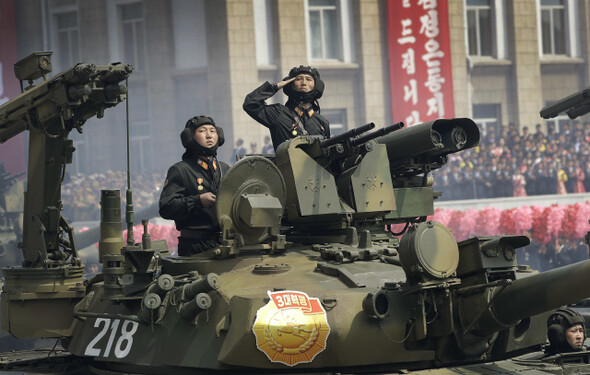hankyoreh
Links to other country sites 다른 나라 사이트 링크
[Editorial] Neighboring countries need to work together to solve N. Korean nuke issue

The crisis on the Korean Peninsula reaches its climax on Apr. 25, North Korea’s Military Foundation Day, when the North might carry out a nuclear test.
On Apr. 24, North Korea’s propaganda organs aimed at the South unleashed a relentless barrage of remarks that presume a war on the Korean Peninsula, referring to “South Korea planning to invade North Korea” and the “USS Carl Vinson being buried at sea.” These remarks largely seem to be propaganda aimed at the domestic audience and designed to soothe anxiety about pressure from the US. The fact that the US State Department has declared (despite North Korea’s provocative rhetoric) that it will not initiate a military clash and that it will not threaten the North can be taken as a positive sign.
The primary reason that tensions on the Korean Peninsula have become so high recently is North Korea’s attempts to bolster its nuclear capability. But the US shares a substantial amount of the responsibility for returning the nuclear-powered aircraft carrier the USS Carl Vinson back to waters near the Korean Peninsula and for remarks by senior American officials, including US President Donald Trump, about the “military option” and a “preemptive strike.” In that regard, the fact that Trump promised to cooperate on the North Korean issue during back-to-back telephone conversations with Japanese Prime Minister Shinzo Abe and Chinese President Xi Jinping on Apr. 23 gives hope for a diplomatic solution.
It was also very atypical of the Chinese government to specifically call out North Korea on Apr. 24 and urge it not to carry out a nuclear test. The Chinese Foreign Ministry noted that the UN Security Council has expressly banned North Korea’s nuclear and missile activities and strongly urged related countries to exercise reason and restraint and to refrain from any action that would heighten tensions. One aspect of China’s hardline stance is illustrated by the fact that China’s state-run newspaper, The Global Times, declared on Apr. 22 that Beijing would engage in deterrence through diplomatic means if the US launched a surgical strike on North Korea’s nuclear facilities, but that a Chinese military intervention would be unnecessary.
If North Korea insists on carrying out a nuclear test even as its neighbors, including China, are calling for restraint, it will be unable to avoid serious repercussions. The time has now come for North Korea to adopt a definite position on whether it will maintain its current course of nuclear armament or whether it will instead seek a diplomatic solution. If Pyongyang refrains from carrying out a nuclear test after Apr. 25, it is likely that some space for diplomacy will open up.
As the North Korean nuclear crisis reaches a serious stage, this is no time for the South Korean presidential candidates to be standing on the sidelines. They need to be putting their heads together to figure out how to resolve the North Korean nuclear issue without a clash and how to establish peaceful inter-Korean relations.
Please direct questions or comments to [english@hani.co.kr]

Editorial・opinion
![[Column] Has Korea, too, crossed the Rubicon on China? [Column] Has Korea, too, crossed the Rubicon on China?](https://flexible.img.hani.co.kr/flexible/normal/500/300/imgdb/original/2024/0419/9317135153409185.jpg) [Column] Has Korea, too, crossed the Rubicon on China?
[Column] Has Korea, too, crossed the Rubicon on China?![[Correspondent’s column] In Japan’s alliance with US, echoes of its past alliances with UK [Correspondent’s column] In Japan’s alliance with US, echoes of its past alliances with UK](https://flexible.img.hani.co.kr/flexible/normal/500/300/imgdb/original/2024/0419/2317135166563519.jpg) [Correspondent’s column] In Japan’s alliance with US, echoes of its past alliances with UK
[Correspondent’s column] In Japan’s alliance with US, echoes of its past alliances with UK- [Editorial] Does Yoon think the Korean public is wrong?
- [Editorial] As it bolsters its alliance with US, Japan must be accountable for past
- [Guest essay] Amending the Constitution is Yoon’s key to leaving office in public’s good graces
- [Editorial] 10 years on, lessons of Sewol tragedy must never be forgotten
- [Column] A death blow to Korea’s prosecutor politics
- [Correspondent’s column] The US and the end of Japanese pacifism
- [Guest essay] How Korea turned its trainee doctors into monsters
- [Guest essay] As someone who helped forge Seoul-Moscow ties, their status today troubles me
Most viewed articles
- 1[Column] The clock is ticking for Korea’s first lady
- 2Samsung barricades office as unionized workers strike for better conditions
- 3S. Korea, Japan reaffirm commitment to strengthening trilateral ties with US
- 4[News analysis] After elections, prosecutorial reform will likely make legislative agenda
- 5[Editorial] When the choice is kids or career, Korea will never overcome birth rate woes
- 6Japan officially says compensation of Korean forced laborers isn’t its responsibility
- 7[Editorial] As it bolsters its alliance with US, Japan must be accountable for past
- 8Why Israel isn’t hitting Iran with immediate retaliation
- 9[Column] Has Korea, too, crossed the Rubicon on China?
- 10All eyes on Xiaomi after it pulls off EV that Apple couldn’t